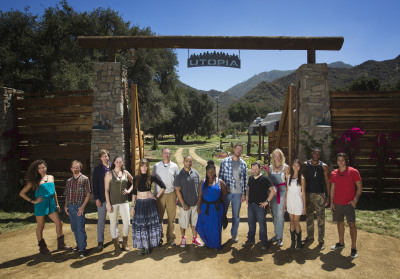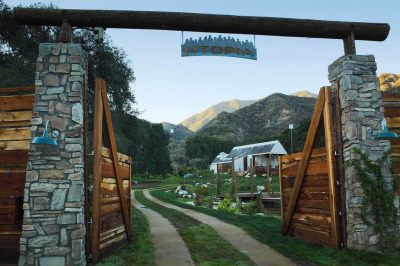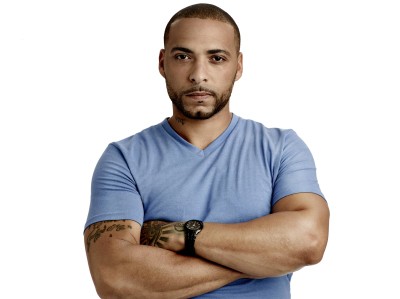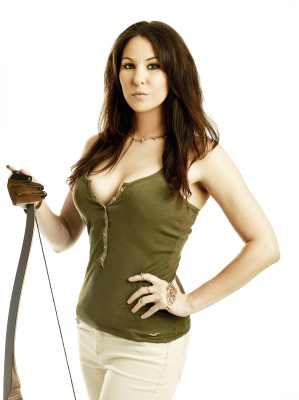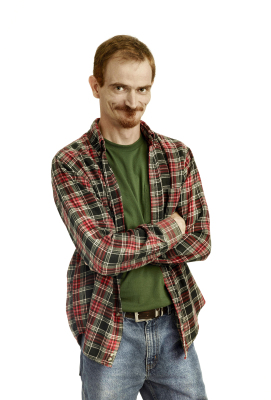On Sunday, September 7th, FOX will present the first episode of a truly different unscripted series – one that the network is called a social experiment: Utopia. The idea of the series is to take fifteen would-be Utopians and isolate them someplace where they can hammer out an ideal (i.e.: utopian) society – then let them try to do it. Utopia is being aggressively scheduled and marketed – following Sunday’s premiere (8/7C), episodes will air on Tuesday, September 9th (9/8C) and Friday, September 12th (8/7C).
Earlier this week, I took part in a conference call Q&A session with Utopia’s Executive Producer, Jon Kroll, and FOX’s Executive Vice President of Alternative Entertainment, Simon Andreae to find out exactly what the show was about – and how things have going since the first fifteen Utopians were brought together.
Hi. Simon, can you talk about what these telecasts are going to look like next week?
Simon Andreae: Yes. Could you be a tiny bit more specific? Do you mean how the story is told or do you mean –
Right. How the story is told. I mean, will this show ever go live? Will the compilations of what’s been happening so far?
Simon: Yes. So here’s a broad format, which I hope answers your question. We’re streaming the show 24/7, as you know, on the internet. In the first five weeks, we’re going to be airing at least two episodes a week. This first week, we have four hours of episodes – a two-hour premiere on Sunday and then an hour at 8 on Tuesday and an hour at 8 on Friday. In the next five weeks, we’re going to have Tuesday and Friday and then, thereafter, just Tuesday.
I say that because what’s actually happening is the episodes are almost like weekly highlight packages of what’s been happening in the few days leading up to that episode. We’re shooting now. We’re editing very fast and assembling the material into either twice or once weekly kind of highlights episodes. There is a very, very fast production turnaround and what you’ll see are the main storylines that have developed through that actual week but, obviously, finessed and edited and contextualized into the primetime episodes. Does that make sense?
It does. Is there ever the possibility that the show will go live though?
Simon: We don’t have plans for that at the moment. I think it’s not out of the question, that a little bit down the line, there may be live episodes or we may catch up with the Utopians at the beginning or end of a primetime episode live. But we’re not doing that just yet.
Is there a message in a show called Utopia or is it just a TV show?
Simon: Would you mind repeating the question? Sorry.
Do you think there is a message, a deeper message, in a show called Utopia or is it just a TV show as far as you’re concerned?
Simon: Oh, no, absolutely not. I think there very much is a deeper, broader message. I can answer that question in two parts. The first is to say that we don’t really see this primarily as a TV show. We see it as a social experiment, as a world that we have set up that abandons and takes for granted nothing about contemporary society in which all the pioneers are rethinking all the fundamental tenets of civilization from scratch, with everything on the table. That’s the point of this.
Then it so happens that we’re soaking their environment in 130 locked-off cameras, filming everything they do, and then arranging it into stories that we’re broadcasting on television. The point of this show is much more about what happens when you get 15 really diverse people, with really different points of views, to start a world from scratch with no laws, no morals, no pre-existing structures, and to observe both their narrative but, also, the broader lessons that we can take away about the way in which we have arranged our world.
You just said that this is kind of a social experiment. It’s supposed to be an area with no rules, no laws, but watching the live stream for almost a week now, it seems like there are actually quite a few restrictions. Can you talk about what the restrictions are on the pioneers and what they are not allowed to do?
Simon: Jon, would you like to start that?
Jon Kroll: Sure. Obviously, we’re bound by federal, state, and local laws as we are very visible, as you have evidenced. Our goal on this is to have as little contact and communication and interference with the community as absolutely possible. We do have certain rules in place, such as the fact that they can’t leave their compound and now that they have a phone, which they just got last night, they can only reach out for reasons of commerce.
It’s designed to keep them in a bit of a bubble, but in terms of how they interact and how they solve their problems, we’re really trying to have them create and enforce their own rules. In fact, they’ve come to us and asked us to interfere at times and we’ve refused to. We’ve said, this is your society, make it work.
But, in that case, they wanted Josh out the first night, but then, I’m assuming, that it was production that required that he return and that they re-evaluate that or whatever. Can you talk a little bit about how that transpired behind the scenes?
Jon: Sure. We actually let them drive that in a way that we never thought we would. We weren’t prepared to have someone leave. We weren’t prepared to give them the ability to vote people out in anything other than the prescribed replacement process, but based on what happened and based on his transgressions, we just turned it over to them. They ultimately kept him in by a 7 to 6 vote. They did a vote the night before when he wasn’t there, but he came back in and faced the music and they voted after hearing him and it was a 7 to 6 vote and he stayed in.
Can you talk about what kind of supplies and tools they’re going to be getting in order to build this society, because I know they’re not getting a lot it sounds like?
Simon: [Indiscernible] Jon.
Jon: They have a phone now and they’re calling hardware stores and supermarkets. They can order whatever they want, but they’ve only got $5,000. There are some scraps and bits and pieces that are lying around the compound that they’re being resourceful and getting working. They’re – I’m watching the live feeds right now and they’re working on a tractor that they’re trying to get running. But we’ve tried to make it challenging. The show in the Netherlands was seen as almost starting them off a little too easy, so we wanted to make it harder.
Alright. Can you talk about how the audience can get involved because I know I was reading there will be voting and things that will be involved in and if you want to try to audition for the show that you’re going to switch out people?
Jon: Sure. Simon, do you want me to take it?
Simon: Yes, you go ahead.
Jon: Okay. There is a replacement process that’s designed to take place once per month and in that process, the 15 Utopians – there are 14 now. I don’t know if you had gotten into this before I got back on the call, but the Utopians nominate or select – the Utopians choose who they think should leave based upon their contribution to the society.
Anyone with two or more votes could leave, and two new people who would like to replace that person arrive, and the Utopians pick one of those to stay and become a permanent member and that person chooses which of those people who got two or more votes must leave. At each of the two selection points, when they’re selecting which Utopians are eligible to leave, and which of the two new people should join, the viewers weigh in and have the 16th vote and they participate in that process.
Simon: I would just add that, as a viewer, as the show goes on, you will be able to put yourself forward as a possible entrant to Utopia.
Quick question for Simon, if I may. You’ve addressed this a little bit, but I wondered if you might offer a thought or two about what makes this a Fox show? Why is this a show that you feel Fox is particularly well-positioned to bring to viewers?
Simon: I think I will say two things. The first is that Fox has a reputation, and a background, in starting new forms and trends in television, generally, and in unscripted particularly. This is a very, very unusual show. It’s not a competition. It’s not an elimination show. There is no prize and, as I mentioned earlier, it’s more of a world we’re covering than a show that we’re creating.
I think in a way, it’s a very innovative idea and an idea that is a bit difficult for some people to wrap their heads around formally. So I think, on the one hand, it’s an adventurous pioneering format and that is just [indiscernible] in a long line of [indiscernible] breaking shows from Fox. Secondly, I think, editorially, it’s going to places that are one in the same time very sophisticated and broadsheet – explorations of religion, sexuality, gender, punishment, and so on.
At the same time, it’s a show with very strong meat, especially in the arenas of sexuality and violence, which you’ve seen, if you’ve been watching the feeds already. I think Fox is also the network that is the least afraid to tackle subject matter that is a little more racy, and a little more taboo, than you might find on the other networks. So both formally, in terms of the structure and format, and creatively, in terms of the types of content, I think it is a pioneering, bold, and edgy show. It fits really well into the Fox catalog.
In terms of Fox marketing this show, a process that you both have had a great deal of input in, obviously, – interesting that [indiscernible] there wasn’t really a whole lot. It was very much a very provocative tease for very good reasons and, obviously, practical reasons. But on the marketing front, how do you strike the balance between being suggestive and a bit mysterious and enigmatic versus really delivering viral clips or things that people can really sink their teeth into? Do you feel like you’ve reached a good balance there?
Simon: Yes, I do. It has been something of a challenge, but I think the team has done really well. The first phase, really we had no pioneers cast, as you know. The first phase in marketing was just about the concept. Fifteen people start a new world – no rules, no leaders, and, as you might have seen from the [indiscernible], there’s no plumbing. So just the concept was stage one. Then as soon as we had cast the pioneers, we moved into the second stage where you’re getting to understand who they are and that each person brings a skill and a strong ideal.
Those really were the two phases that we had planned, up until the launch of the show. I think the thing that took us all a bit by surprise, but that we were delighted by, is that the first three days of the pioneers’ new life in Utopia was so explosive and so filled with conflict and triumph and extremity of all kinds, that we moved into a slightly fast turnaround final phase where we’re now being able to show some of the clips of what’s happened in the first three days, in the final few days of promotion before air.
It wasn’t really our intention either to be salacious or titillating or provocative or whatever with the pioneers. We really just wanted to show who they were and have people imaginatively engage with what might happen when they got together. Having said that, the first three days have been so explosive, that it seemed sensible to showcase some of that.
Jon: I should add that Simon is delighted, but I’m exhausted. And delighted.
Jon, I’m going to put you in a corner here because we talked about this last week. Briefly, have you guys let out the secret of who’s going to do the theme song that Miss Montreal does on the Dutch version of the show?
Jon: I believe that was just released this morning.
Oh. What is that? Who’s the artist?
Simon: The artist is Daughtry, Chris Daughtry.
Oh my God. Awesome. Okay. A quick follow up question. With Andrea being voted – or not voted off. Andrea never came onto the set, so what happened with that? How did that work? I understand she broke her contract by trying to reach out to others. How did she do that?
Simon: Let me start with that and then, Jon, do [indiscernible] as you wish. What happened is that we brought all the pioneers to a single location that was near Utopia and we wanted to keep them separate from each other and also to have some last minute briefings before they went in. That was a period of approximately a week. It was important to us that the pioneers did not meet each other, and did not know about each other, because we wanted them to go in and come face-to-face for the first time.
That was very clear to all of them. It was in their contracts and they were briefed a number of times about it. Andrea smuggled in a smartphone and she looked up other pioneers on the smartphone. It was clearly crossing the boundary of what was in her contract and what we thought was creatively important for the show. So we, sadly, had to let her go. That’s really – that’s the sum of it.
So how is this going to affect what you do for the first person being brought in? Will that speed that process up a little bit for a new Utopian to come in?
Simon: Yes. Yes it will. What we’ve decided to do is we want there to be 15 pioneers. When they received their initial briefing, when they first approached the [indiscernible] about what their finding and what their mission, as at it were. We explained to them that there are 14 of them and that they will get to choose the 15th pioneer.
That really is just a speeding up of the replacement process because two potential new pioneers will be sent, probably at the end of this week, and then we just kick into the process that Jon described earlier, where each of the two new pioneers is trying to prove their worth over a short period of time and then the Utopians will gather and decide which to keep and which to release back to the real world.
Jon: Just to add to that, there will not be a viewer vote component to this simply because this is all happening before the first episode airs in real time, so the viewers don’t have time to have made the connection with them. But I will say that the individuals that are closely being considered are people who might be able to, or might think they have the ability to, bring a little bit of order to what’s been going on.
What’s been the biggest challenge so far among those 14 participants? What’s been the biggest challenge they’ve had to deal with?
Jon: Agreeing on anything. No, I think the biggest challenge has been, even though they knew they were going to be with very, very different types of personalities, I almost think we cast it too well for diversity in terms of thought, point of view, background, because they are so incredibly different that coming to the most basic decisions have been next to impossible for them.
They can’t agree as to whether they’re a democracy. There are two people who are talking about ceding and forming the free states of Utopia. We’re sitting here aghast. It’s day six and it’s just happening at light speed and we just try to keep up with them. I think it’s really, coming to decisions has been the biggest challenge for them.
Simon, a lot of people in the TV industry think that is a huge roll of the dice, maybe the big gamble of the season, the fall season by Fox, to devote so much time to this, so much resources. To go with a three-night premiere starting Sunday, two hours on the first night, then go twice weekly. Why the decision to go that far so soon with a premiere show like this? Obviously, concept, I’m just curious what else plays into the decision to do the three-night premiere, to go twice a week after that, and so on?
Simon: Yes. I think, for of all it, it’s a huge, ambitious idea. It just deserves a decent amount of screen time. I think, in a way, that’s the most obvious answer. Having said that, I think that it’s also an idea of which is, on the one hand, extremely simple. Start the new world; see if you can do better, and, at the same time, really sophisticated. I mentioned earlier it’s about religion, law, ethics, sexuality, politics, and all of those deep themes that are the crucible of any society.
I think in order to be able to have an audience grasp that, and 15 different people, once a week is a little too small of a window for the audience simply to be able to absorb, appreciate, and keep up. I think it makes absolute sense that in the early period of the transmission of Utopia, people are going a little bit more to put their arms around, and grasp, and absorb.
Honestly, we talked a little bit about whether we might have it on air twice a week throughout the run but, as you know, we’re a broadcast network with a mix of genres including scripted, and comedy, and sports, and so on, and we don’t easily have the real estate to provide more than a one-hour window a week, once people are into the story.
On the nature of the gamble, I know it’s true that it’s a large undertaking. It’s an expensive and extremely ambitious show. Having said that, that’s what we love about it, but this network has never been afraid to roll the dice. Never afraid of risk and scale and so on. We, honestly, the whole team, from [indiscernible], through publicity and marketing, through to David and Dana and Gary and Peter, have all been, honestly, pretty happy and relaxed to embrace the risk.
Jon, one other thing. What is the production like physically in terms of using, let’s say, handheld cameras, or sky cams, or all sorts of the tricks of the trade, if you will, to capture all this?
Jon: It’s highly unique in that there are no manned cameras at all in Utopia. There are no interviews. There are some manned cameras used for background packages and on the first day but, basically, ever since day one, we’ve been without any handheld cameras at all. But the way that the robotic cameras have been installed is highly innovative and is designed to look like handheld coverage. The effect of that is they don’t see crew. They don’t see any people. There aren’t people in the bushes or behind a window. We’re a good couple hundred yards away in a production compound.
The control room looks like NASA. I’m sure some of the people on this call have been to the control room and it’s truly amazing. I’ve been to a lot of control rooms. We have 130 cameras. We stream about – we record about 288 hours of content per day. Over the course of the year-long social experiment, we’re going to record over 100,000 hours of content. It’s really amazing.
Six days into this social experiment, are any of the pioneers emerging as the most interesting or like main characters in the process?
Simon: Jon, you start.
Jon: I think that several are for different reasons. There are people who are really struggling and have already expressed, is this the right thing for them, including our terrific pastor, Jonathan Lovelace. There are people who are assuming leadership roles. Josh, our contractor, tried. Mike, our lawyer, has now taken on that role. Red, our hillbilly handyman, desperately would like that role. Aaron, our chef with a military background, is a strong personality.
I would say, overall, the men have really taken an aggressive position at the start and have dominated a lot of the activity; however, Hex, our six-foot tall huntress, is right in the middle of the mix and not backing down to anybody.
May I ask a follow up question about Hex really quick before, Simon, you get a chance to answer? I heard that she had a health scare and that it wasn’t shown online? Was there any reason that it wasn’t shown online?
Jon: Yes. Whenever we [indiscernible] situation like that, we’re very careful, because we don’t know what’s going to happen. It turns out, they’re in 100-plus temperatures, and they’re doing labor, and working, and sleep-deprived, and she had dehydration. She was treated. She was fine, but we don’t want to – until we know the gravity of a situation like that, we don’t necessarily want to stream it sometimes. We just want to be careful.
That makes sense. Okay.
Simon: To Jon’s point about the characters emerging, I totally agree. I would only add that one more, Dave Green, who was in and out of prison from when he was 17 to 27 and is a former gang member, has played a crucial role in kind of, amidst all the conflict, and drama, and sleeplessness, and [indiscernible] of food that they’ve experienced over the first few days, he is the person who has been kind of the greatest inspiration to the others.
He’s given some wonderful motivational speeches about the opportunity that they’ve been given, and the adventure of a lifetime, and the privilege that this has all bestowed on them. That has been pretty moving both to the other pioneers as, indeed, I hope it will be to the audience.
Jon: I should add to that because I was remiss in not mentioning Dave in my initial list. Dave has formed an unlikely bromance with Kentucky Red, our self-proclaimed hillbilly. He has remarkably warmed up to Jonathan Lovelace, the pastor, and is expressing a desire to perhaps be baptized.
With the show being such a long format and really no end in sight, which I think is very cool, what is it that Utopia has that’s going to keep viewers committed for such a long period?
Simon: That’s a very good question. I think, in a way, Utopia has as much in common with a serialized, scripted show, even like a primetime soap opera, as it does with a traditional reality show. In a traditional reality show, you’re relying on the drama of format constructs, like elimination and cash prices. As you know, we don’t have that here. I think what’s going to invest the viewers is the gross and development of these characters, both their own trajectories and their trajectories together, their relationships with each other.
We’ve mentioned a lot about the conflict of the first few days and the unlikely alliance between the country [indiscernible] hillbilly, Red, and the city [indiscernible], Dave Green, but there is also a major undercurrent of physical and sexual and romantic attraction and people seem to be kind of trying to pick who might be their partners in Utopia. It’s kind of fascinating because there is more than one individual who is either bisexual or polysexual, so it’s not an easy environment to navigate.
Just seeing people size up what their opportunities might be for romance, and the obstacles they might encounter, and the competition they might encounter, really has a lot of the best ingredients of the most high octane soaps. I think what people are going to do is hook into the characters, pick their favorites, and follow them through triumph and tragedy, through the melting pot and caldron of this brand new world with no rules and see what adventures they go on, where they end up, and root for them, cry with them, laugh with them, and all the rest of it.
Jon: If I could add to that, I grew up in a Utopian community myself and have witnessed this stuff unfold. What I see happening in the long-term is, first of all, people are going to be living with their mistakes. There are going to be romances that start and end and they have to evolve into another form and that’s going to be fascinating to see unfold.
Also, the constant influx of new blood adds new dynamics and that’s one of the challenges for we, as producers, to continually add people who challenge the group in different ways, add new skills but, also, new points of view. That continual refreshing is what’s going to keep this going for a year and perhaps even beyond.
When you’re casting these pioneers, what are the qualities, or characteristics, you’re looking for in people? Is it you want one farmer, once you’ve got a farmer, you’re moving onto somebody else? How’s that working?
Simon: I think it’s kind of three things that are working together. Each individual has to have a very strong, charismatic, magnetic personality anyway. That’s the case with any unscripted show. That’s the first thing. The second thing is we want everybody beyond that to have both a skill and a strong point of view. The skills, there are certain skills that are particularly useful here – the skill of being a contractor, of being able to handle animals, of being able to identify and forage for plants, to be able to cook, and so on.
There are a number of those and then there are a number of very particular contrasting ideals that we wanted. We wanted people on very different points of the spectrum over, for the sake of argument, religion or monogamy. So each individual had to be powerfully charismatic, bring a useful skill, and have a strong ideal. Then beyond that, we then have to mix it all up and look at the group as a whole, make sure it was sufficiently diverse in terms of race, and age, and gender, and then play with that Rubik’s Cube until everything seemed to be balanced.
It was not an easy task, but it enormous fun. In the end, honestly, I suppose I would feel – Jon, I’m sure you agree. There were probably 50 or 60 people whom we thought were fantastic and getting down to the last 15 has been the source of the greatest fun, but also conflict and debate between the producers.
Jon: But we may, as things go on, see a bunch more of those 50. We’ll have to see.
Cast and Setting photos by Adam Rose; Portraits of Dave, Hex and Red by Christopher Frangapane/Courtesy of FOX
